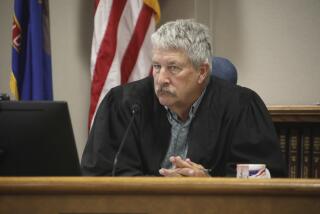Evidence Allowed on Pain to Fetus
- Share via
NEW YORK — The federal judge hearing a court challenge to the government’s ban on “partial-birth” abortions will allow a doctor to testify that a fetus may experience pain during the procedure.
In a ruling made public Monday, U.S. District Judge Richard Conway Casey denied a motion by abortion providers to block the physician’s appearance at the nonjury trial, scheduled to begin here next week.
The case will be closely watched because similar legal actions are pending in California and Nebraska. Critics of the ban, which President Bush signed into law in November, have argued that the pediatrician’s testimony would be “rank speculation.”
But Casey said that the appearance of Dr. Kanwaljeet S. Anand, who specializes in caring for critically ill newborns and children, “will assist the court in assessing the reasonableness of Congress’ factual findings that partial-birth abortion is a brutal and inhumane procedure.”
The pediatrician contends that a fetus can experience pain at 20 weeks of gestation.
“Dr. Anand’s opinion is based on anatomical, functional, physiological and behavioral indicators that are correlated with pain,” the judge said in his ruling. “His extensive experience and research ... is sufficiently reliable.”
The law being challenged by the National Abortion Federation, a providers’ organization, prohibits procedures that involve the partial removal of an intact fetus from the womb.
Abortion-rights groups have argued that performing what opponents call a “partial-birth” procedure was sometimes medically necessary to protect a woman’s health, and that the ban therefore violated her constitutional right to have an abortion.
Physicians who perform what they call “dilation and extraction” could face up to two years in prison, in addition to monetary fines.
Last week, Casey ordered New York Presbyterian Hospital to turn over to the Justice Department records of abortions performed by two physicians who are plaintiffs in the case. The government contends that it is necessary to review the records to learn if there are instances in which this type of abortion is medically necessary.
But the hospital had argued that surrendering the documents could violate patients’ privacy, even though the names of women who had received the abortions and other data -- including telephone numbers, addresses and Social Security numbers -- would be deleted.
“This action brings into conflict two profoundly important interests: respect for the sanctity of the physician-patient relationship, and the search for truth at the heart of the litigation process,” Casey said.
He ordered the abortion records be turned over with the understanding that they would either be destroyed or returned within 60 days after the case was completed.
Lawyers for the hospital are considering appealing the judge’s order.
More to Read
Sign up for Essential California
The most important California stories and recommendations in your inbox every morning.
You may occasionally receive promotional content from the Los Angeles Times.










